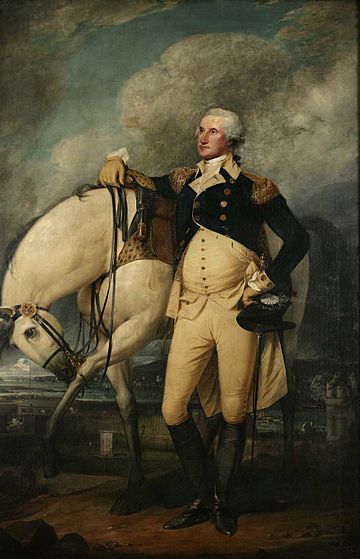George Washington (John Trumbull, 1790) facts for kids
Quick facts for kids George Washington |
|
|---|---|
 |
|
| Artist | John Trumbull |
| Year | 1790 |
| Medium | oil on canvas |
| Dimensions | 270 cm × 180 cm (108 in × 72 in) |
| Location | New York City Hall, New York City |
George Washington is a large painting created by the American artist John Trumbull in 1790. It is also known as Washington and the Departure of the British Garrison from New York City. This artwork shows George Washington, who was the first President of the United States. It is painted using oil on a large canvas.
Trumbull painted this artwork after his earlier painting, Washington at Verplanck's Point, was very popular. He had given that painting to Washington's wife, Martha. Because of this success, the City of New York asked Trumbull to paint a portrait of President Washington in July 1790.
Instead of starting a new painting, Trumbull made his earlier work much bigger. He increased its size almost four times. The two paintings look very similar in how they are set up. The main difference is the background behind Washington's horse. The new painting shows an important day called Evacuation Day. This was when the British left New York City on November 25, 1783, and Washington returned. This famous painting is now in the historic Governor's Room at New York City Hall.
Creating the Painting
John Trumbull had already painted several smaller pictures of President Washington. One of these was a full-length portrait for Mrs. Washington. People thought it looked very much like him. Because of this, Trumbull decided to paint a much larger portrait for New York City.
This new painting shows Washington with a horse. The background shows the British leaving New York City after the American Revolution. It includes the harbor, ships, and parts of the city's old defenses. Trumbull hoped the painting would be well-received. He knew it would hang in a very important room in America.
What the Painting Shows
The way Washington is posed and the overall look of this painting are almost the same as Trumbull's earlier work, Washington at Verplanck's Point. However, the background behind the horse is different.
In the earlier painting, the background showed a review of Continental Army troops. This event happened in 1782 for a French general named Rochambeau. For the new painting, Trumbull changed the background. He showed an ideal scene of Evacuation Day. This was when Washington returned to New York City after the British left on November 25, 1783. The painting is still displayed in the Governor's Room at New York City Hall.
Later Engravings
In 1899, an artist named Samuel Arlent Edwards made an engraving of the painting. An engraving is a print made from a picture. He called his version Washington. He noted that it was made "From the painting by J. Trumbull in the City Hall, New York."

